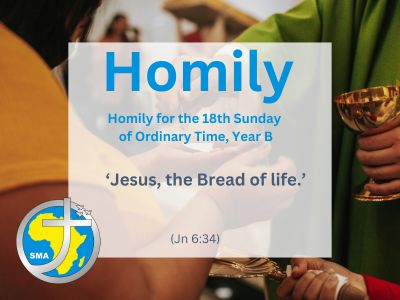Readings: Exodus 16: 2-4, 12-15; Ephesians 4:1-17, 20-24; John 6:24-35
Theme: Jesus, the Bread of life
‘And did you get what
you wanted from life, even so?
I did.
And what did you want?
To call myself beloved, to feel myself
beloved on the earth.’
These are the words of American poet and short story writer, Raymond Carver, from his last poem ‘Late Fragment’, written as he was dying of cancer at the age of 50. Reflecting on his short and fragmentry life, marked by a broken marriage and struggles with poverty and alcoholism, Carver asks himself if he has fulfilled his ultimate goal in life? He answers that he has, because what he really desired was to know that he was loved and to call himself beloved. Carver’s question challenges us also to ask ourselves if we have found what we are looking for in life. Have we found answers to the deepest desires of our hearts? This is the question addressed in today’s readings.
Our first reading, taken from the Book of Exodus, tells the story of how the initial euphoria of the Israelites on being freed from servitude in Egypt evaporates when they face the inhospitable conditions of life in the wilderness. Predictably, they rail against their leaders, Moses and Aaron, and long to return to the ‘fleshpots of Egypt’. In response, the Lord sends them manna and quails to sustain them on their journey. In the words of today’ responsorial psalm: ‘The Lord gave them bread from heaven’. Still the people continued to complain about their circumstances, failing to appreciate the Lord’s loving concern for them, and to trust him.
Today’s gospel passage, from John, recalls the experience of the Israelites. Following his miraculous feeding of the five thousand with five barley loaves and two fish, Jesus was forced to escape the crowd who wanted to make him king. They set out to look for him again and find him in Capernaum, puzzled as to how he got there. Aware that they are seeking him for the wrong reason, Jesus says: ‘I tell you most solemnly, you are not looking for me because you have seen the signs but because you had all the bread you wanted to eat’ (Jn 6:26). He challenges them to look beyond their physical hunger to the deeper hunger of their hearts: ‘Do not work for food that cannot last, but work for food that endures to eternal life’ (Jn 6:27). Then, in an astounding statement, he says that he, the Son of Man, is the one who can satisfy their deepest hunger: ‘I am the bread of life’ (Jn 6:34). This is the first of seven great ‘I am’ statements in John’s Gospel, in which Jesus reveals his true identity as the Son of God. The words, ‘I am’, echo God’s name as revealed to Moses (Ex 3:14).
When Jesus says that he is ‘the Bread of Life’, he is saying that he is the answer to the deepest longing of the human heart. Besides our physical hunger which is easily satisfied, we have other more profound hungers like the need to feel accepted, to feel wanted, to be loved and to love – hungers that may not be easily satisfied. But deeper even than these hungers, we have a hunger which only God can satisfy, as St Augustine, after many years of fruitless search, discovered for himself: ‘You have made us for yourself, O Lord, and our hearts are restless till they rest in thee’. It is this hunger for God that Christ promises to satisfy: ‘The one who comes to me will never be hungry; the one who believes in me will never thirst’ (Jn 6:35).
In our second reading today, from his Letter to the Ephesians, St Paul exhorts us not to let ourselves be led astray by the illusory desires of our hearts but to focus our lives on Christ so that we can ‘put on the new self that has been created in God’s way, in the goodness and holiness of the truth’ (Eph 4:24). The illusory desires Paul is referring to are the desires that captivated the hearts of the pagans – the desires for fame, prestige, wealth and power. These are like junk food that kills rather than nourishes. Only Christ, the true bread of life, nourishes and transforms us, enabling us to live in a new way, in God’s way.
In today’s Eucharist, Jesus is inviting us to let him into our lives fully and unconditionally, to let him be as close to us as the bread we eat. He will nourish and sustain us on the journey of life, and fulfill the deepest longing of our hearts. As ‘the bread of life’ he wants to give himself totally to us, so that we in turn learn to give ourselves to our brothers and sisters. In this way we, too, become bread broken for a world hungry for that Love which is God’s way of being. And this is our mission. I end with a prayer composed by Ivan Nicoletto, OSB:
‘May we be always hungry and thirsty for Love.
May our hearts and minds be soft and receptive to God’s abundant life.
May our bodies have open doors and windows to welcome the approaching, unknown future.
May we welcome, bless and share this Universe,
this earth, this time,
as a lavish banquet of grace God is setting’ (Taken from his book, Journey of Faith, Journey of the Universe).

